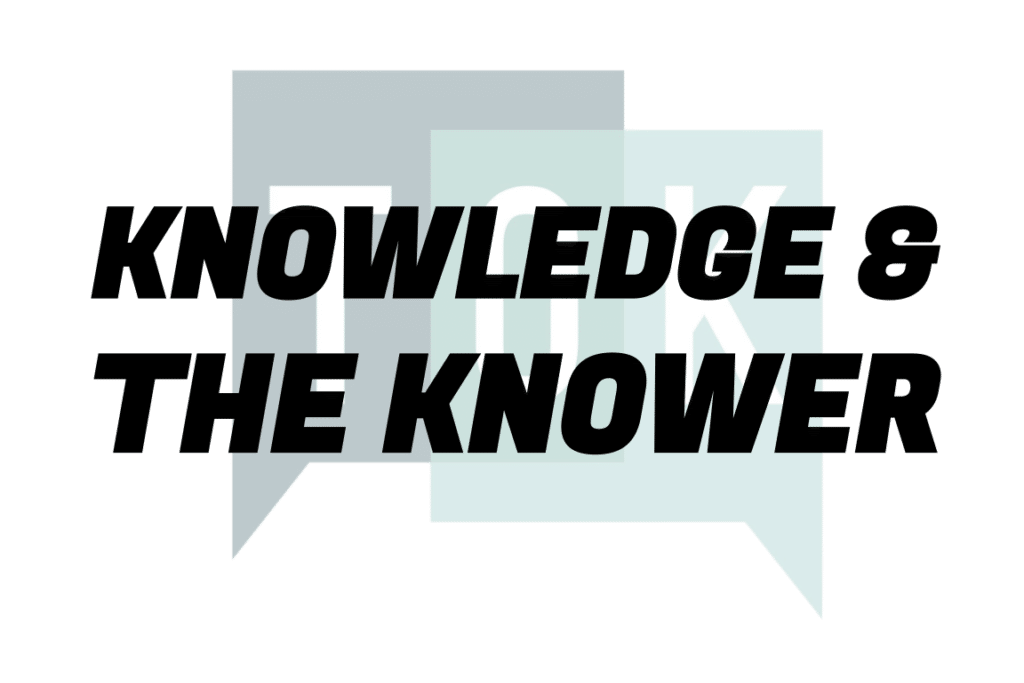
Welcome to the knowledge & the knower section of the site. This page will help you to take ownership of the core theme via a quick overview, and four padlets that offer you quotes, knowledge questions, real-world issues, and key thinkers relating to this optional theme.
You can use this content both to understand this component of TOK, and support discussions and arguments that you offer in your essay and exhibition.
Knowledge & the knower: a quick overview
Knowledge & the knower – the core theme of TOK – takes students on an exploration of the relationship between individual knowers and the knowledge they seek to comprehend. It delves into the pivotal role of personal cognition, biases, and experiences in shaping our understanding of the world. The core theme, links to several key concepts.
Perspective plays a central role, representing the lens through which individuals perceive and interpret the world, shaping their understanding and ability to explain reality. The concept of objectivity challenges us to critically examine the extent to which we can detach ourselves from personal biases and emotions when seeking to understand and convey knowledge. Responsibility underscores the ethical dimensions of knowledge, emphasizing the role of the knower in shaping the truth and values associated with the knowledge they possess.
Two influential thinkers in the realm of knowledge and the knower from diverse backgrounds are Elizabeth Loftus and John Stuart Mill. Elizabeth Loftus, an American cognitive psychologist, has examined the malleability of human memory, revealing the potential for cognitive biases to shape our
understanding of past events. John Stuart Mill, a British philosopher, examined the limitations of human knowledge, and how by developing more intellectual humility we make it easier for our ourselves to develop a greater understanding of the world.
Contemporary issues related to knowledge and the knower are both relevant and thought-provoking. Discussions on cognitive biases highlight the ways in which inherent mental shortcuts can influence our perception and interpretation of information, sometimes leading to errors in judgment. Additionally, debates on digital identity raise questions about the construction of online personas and the impact of technology on our sense of self and knowledge formation.
The core theme encourages students to critically reflect on their own perspectives, biases, and ethical responsibilities as knowers. It emphasizes the importance of self-awareness, critical thinking, and empathy in navigating the complex relationship between the knower and the knowledge they seek and share.
1 QUOTES Who said “Man is a reasoning rather than a reasonable animal”?
Explore these quotes on knowledge & the knower by a wide range of different thinkers. Which quotes are the most and least insightful? How they challenge our assumptions about the core theme? What do they reveal about links between the core theme and other aspects of the TOK course?
2 KNOWLEDGE QUESTIONS Can knowledge ever be truly original?
Identifying and exploring knowledge questions (KQs) is at the heart of TOK, prompting us to reflect on our knowledge, evaluate whether it’s be based on a flawed or incomplete assumptions, and provide us with a focus point to improve our understanding of the world.
3 REAL-WORLD ISSUES How does compassion fatigue influence our worldview?
These examples will help you to understand how TOK ideas manifest in the real-world, take ownership of knowledge & the knower, link TOK to the latest global issues, and become an authentic critical thinker. They will also help you to justify and explore the discussions you offer in your essay and exhibition.
4 KEY THINKERS Why does Taiye Selasi argue that nationality is an illusion?
The thinkers in this padlet will help you to consolidate your understanding of knowledge & the knower, and challenge your assumptions about the world. You can also draw on their ideas to support your essay and exhibition discussions, and add depth and authority to the claims you make about knowledge.

Subscribe to the free TOK newsletter!
Subscribe to our free newsletter, and collect fantastic examples to help you understand the key TOK ideas, support your essay and exhibition, and make you an authentic critical thinker.
You’ll encounter some of the most important thinkers from the past and the present, go beyond the headlines of contemporary events and issues around the globe, and see how TOK concepts manifest in the real-world. Subscribe HERE!